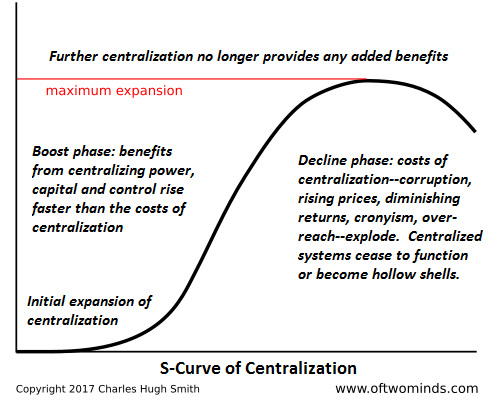Other governments are keenly interested in following China's lead.
The scope of this surveillance is so broad and pervasive that it borders on science fiction: a recent Western visitor noted that train passengers hear an automated warning on certain lines, in Mandarin and English, that their compliance with regulations will be observed and may be punished via a poor social score.
In the Song Dynasty, arguably China's high water mark in many ways (before the Mongol conquest changed China's trajectory), social control required very little force. The power of social control rested in the cultural hierarchy of Confucian values: one obeyed the family's patriarch, one's local rulers and ultimately, the Emperor.
Power is people choosing of their own accord to comply, for reasons they find sound and that serves their self-interest; there is little need for the application of force.
Power is highly leveraged; a relatively small police/military and judiciary is all that's needed. Force, in contrast, doesn't scale: it's enormously costly in capital and labor to monitor an entire populace and impose control and obedience.
While the Song Dynasty had a police force, a judiciary and an army, the populace generally managed itself via an internalized secular religion that placed the father, civil authorities and the Imperial state at the top of a natural order that enabled the harmony of Heaven and Earth. To disobey would be to threaten the harmony that served everyone.
In the early days of the Communist revolution (1949 to 1965), the majority of China's populace embraced the values and authority of the Communist regime, despite the monumental hardships and setbacks of the Great Leap Forward (millions dying needlessly of starvation) and other centralized incompetencies.
But the Cultural Revolution that was launched with Mao's blessing in 1966 was only embraced by the youthful Red Guards. The rest of the society had to be monitored and forced to comply with the mercurial injustices and arbitrary nature of the Cultural Revolution, which imprisoned millions of China's most accomplished citizens in various forms of forced deprivation: house arrest (the most mild); forced relocation to rural labor, re-education (i.e. torture) and imprisonment. Many were killed without even the semblance of a judicial process.
In broad brush, the Cultural Revolution broke the social power of the Communist Party and government. Thereafter, the Party and the state only had force at their disposal.
The rise of broadly distributed prosperity (Deng's "to get rich is glorious") replaced the failed power of Communist ideology with a new social contract:obey the party and the state and you'll become prosperous.
If this new contract were considered rock-solid power, why would China's government need the vast surveillance system they're putting in place for fine-grained control of the populace?
It suggests to me that the leadership (Xi and his cabal) are aware that the prosperity is not permanent, nor is it being distributed evenly enough to harmonize Heaven and Earth. Sensing their lack of social power, they are turning to technology to create a vast system of coercion (force).
Force is not a substitute for power. For this reason, the "Social Credit Score" system smacks of desperation. But China's history is clear: the culture and the people prefer a system in which power is maintained through social norms, not force. With Communist ideology a dead force, and prosperity about to wither, what's left? A system of forced obedience backed by Orwellian technology.
Other governments are keenly interested in following China's lead. "Prosperity" isn't just phantom and asymmetrically distributed in China; it's phantom and asymmetrically distributed almost everywhere, and so other governments are just as desperate to protect their elites and control their restive populaces.
Centralized force has limits. Like everything else we reckon has god-like powers, it works until it doesn't.
NOTE: Contributions/subscriptions are acknowledged in the order received. Your name and email remain confidential and will not be given to any other individual, company or agency.
Thank you, Ross M. ($5/month), for your splendidly generous pledge to this site -- I am greatly honored by your support and readership.
| |
Thank you, Dale K. ($5/month), for your superbly generous pledge to this site -- I am greatly honored by your support and readership.
|
























